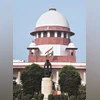The Supreme Court on Friday reserved its order in the Adani-Hindenburg case and indicated it might pass some more directions to the Securities and Exchange Board of India (Sebi).
Sebi told the court it would not seek an extension to complete its investigation of the matter.
“We are not seeking any extension. There are 24 cases. Of the 24, investigation in 22 is over. For the remaining two, we need information from foreign regulators, etc,” Solicitor General Tushar Mehta, appearing for Sebi and the Centre, told the court.
Chief Justice of India (CJI) D Y Chandrachud asked Mehta what was being done to protect investor interests.
“There is extreme volatility in the stock markets. What is Sebi planning to do for this kind of volatility for the investors,” the markets regulator was asked.
Also Read
Mehta said action had been taken against short-sellers on instances found. “Wherever we’re finding short-selling (instances), we are taking action,” Mehta said. Mehta said he had no problems with the Supreme Court-formed expert committee report.
“There is no objection to the recommendations of the expert committee for strengthening the regulatory mechanism. Those are under consideration and in principle we have accepted them,” Mehta said.
The expert committee in its interim report in May said it saw “no evident pattern of manipulation” in the Adani firms and there was no regulatory failure. The panel, however, had cited certain amendments made by Sebi between 2014 and 2019 that had hampered the regulatory body’s ability to investigate. The committee said its probe into alleged violations of money flows from offshore entities had “drawn a blank”.
Mehta then took the Bench of the CJI, Justice J B Pardiwala and Justice Manoj Misra through the recommendations of the expert committee. He said action would be taken by the regulatory body in accordance with the law. Meanwhile, Advocate Prashant Bhushan, appearing for one of the petitioners, told the court Sebi’s conduct in the matter had not been credible.
“We have come to the conclusion that the Sebi probe is not credible. They (Sebi) say 13 to 14 entries are linked to Adani but they cannot look into it because the FPI (foreign portfolio investment) guidelines were amended,” he said. The court said the regulator could not be asked to go by what the media had to say on the subject. “Mr Bhushan, I do not think you can ask a financial regulator to take something printed in a newspaper. This does not discredit Sebi. Should Sebi now follow journalists?” the CJI asked. Bhushan replied: “If journalists are getting these documents, how can Sebi not get them?”
Mehta said media reports were being “planted” to influence India’s policies. “There is a growing tendency of planting stories outside India to influence decisions in India,” Mehta said.
The report by non-profit media organisation Organised Crime and Corruption Reporting Project said “hundreds of millions of dollars” were invested in Adani Group stocks through opaque investment funds based in Mauritius.
Bhushan also raised concern over the inclusion of two members of the expert committee -- advocate Somasekhar Sundaresan (now appointed Bombay High Court judge) and former State Bank of India chairman O P Bhatt. Sundaresan had appeared for Adani before Sebi when he was practising and Bhatt was chairperson of a company that partnered Adani Group, he said. Therefore, there was a conflict of interest, Bhushan submitted.
The court, however, said these were unsubstantiated allegations. “He (Sundaresan) was not in-house counsel, he was a lawyer. He appeared in 2006. This conflict arose 17 years later. You have not even attached any more instances. Then how do we take these unsubstantiated allegations on record?” the CJI asked.
In January this year, Hindenburg Research came up with a report accusing Adani Group of improperly using offshore tax havens and flagging concerns about high debt.
It also alleged that there was “brazen stock manipulation” using offshore shell companies.

)
